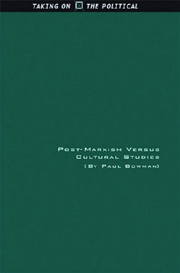Two - Cultural Studies versus Post-Marxism
Published online by Cambridge University Press: 12 September 2012
Summary
… metaphors are serious things. They affect one's practice
(Stuart Hall 1996: 268)Two Texts of Cultural Studies
As introduced in the previous chapter, ‘textuality’ is often regarded ambivalently, as a dubious achievement, one sometimes even pejoratively held to be directly related to sheer ideology (Bewes 2001; Mowitt 1992: 12–13). As was also seen in that chapter, Stuart Hall, too, views textuality extremely ambivalently. However, John Mowitt unambiguously embraces the challenge of this ambivalence, asking, ‘Would it not make more sense to acknowledge that the textual model is internally fissured by a conflicted relation to disciplinarity and that the literary appropriation of this model which has indeed taken place in history has obscured, or at least contained, this conflictual relation?’ (Mowitt 1992:14) For Mowitt, the text is ‘irreducibly entangled in disciplinary politics and not merely as the articulation of an effort to reorganize disciplinary boundaries … but as a critical practice seeking to problematize the cultural work effected by the disciplines … Or, put another way, the text must be made to oppose the discipline(s) that made it’ (14). In this regard, Stuart Hall's position surely coincides affiliatively with Mowitt's, because for Hall it is inestimably important that cultural studies maintain a ‘real critical and deconstructive edge’ in its awareness of its institutional context. For Hall, cultural studies must ‘remain a critical and deconstructive project [that] is always self-reflexively deconstructing itself’ (Hall 1996d: 150).
- Type
- Chapter
- Information
- Post-Marxism Versus Cultural StudiesTheory Politics and Intervention, pp. 55 - 98Publisher: Edinburgh University PressPrint publication year: 2007



